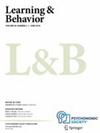联想学习在敏化中的作用。
IF 1.5
4区 心理学
Q3 BEHAVIORAL SCIENCES
引用次数: 0
摘要
在巴甫洛夫敏感化中,条件刺激被称为激活反应模式(例如,进食、性或恐惧),这导致对激活相同反应模式的其他刺激的反应增加。巴甫洛夫致敏效应可能产生于任何高度唤起的刺激,这对焦虑症、认知和学习神经生物学的研究具有很高的翻译意义。本文章由计算机程序翻译,如有差异,请以英文原文为准。
The role of associative learning in sensitization.
In Pavlovian sensitization, conditioned stimuli are said to activate response modes (e.g., feeding, sexual, or fear), which result in an increase in the response to other stimuli that activate the same response mode. Pavlovian sensitization effects are likely to result from any encounter with a highly arousing stimulus, leading to high translational relevance for investigations of anxiety disorders, cognition, and the neurobiology of learning.
求助全文
通过发布文献求助,成功后即可免费获取论文全文。
去求助
来源期刊

Learning & Behavior
医学-动物学
CiteScore
2.90
自引率
5.60%
发文量
50
审稿时长
>12 weeks
期刊介绍:
Learning & Behavior publishes experimental and theoretical contributions and critical reviews concerning fundamental processes of learning and behavior in nonhuman and human animals. Topics covered include sensation, perception, conditioning, learning, attention, memory, motivation, emotion, development, social behavior, and comparative investigations.
 求助内容:
求助内容: 应助结果提醒方式:
应助结果提醒方式:


